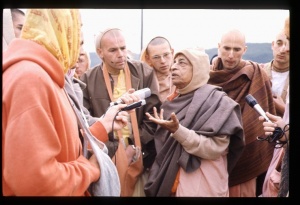SB 4.16.27

A.C. Bhaktivedanta Swami Prabhupada
TEXT 27
- diśo vijityāpratiruddha-cakraḥ
- sva-tejasotpāṭita-loka-śalyaḥ
- surāsurendrair upagīyamāna-
- mahānubhāvo bhavitā patir bhuvaḥ
SYNONYMS
diśaḥ—all directions; vijitya—conquering; apratiruddha—without check; cakraḥ—his influence or power; sva-tejasā—by his own prowess; utpāṭita—uprooted; loka-śalyaḥ—the miseries of the citizens; sura—of demigods; asura—of demons; indraiḥ—by the chiefs; upagīyamāna—being glorified; mahā-anubhāvaḥ—the great soul; bhavitā—he will become; patiḥ—the lord; bhuvaḥ—of the world.
TRANSLATION
No one will be able to disobey the orders of Pṛthu Mahārāja. After conquering the world, he will completely eradicate the threefold miseries of the citizens. Then he will be recognized all over the world. At that time both the suras and the asuras will undoubtedly glorify his magnanimous activities.
PURPORT
At the time of Mahārāja Pṛthu, the world was ruled by one emperor, although there were many subordinate states. Just as there are many united states in various parts of the world, in olden days the entire world was ruled through many states, but there was a supreme emperor who ruled over all subsidiary states. As soon as there were some discrepancies in the maintenance of the varṇāśrama system, the emperor would immediately take charge of the small states.
The word utpāṭita-loka-śalyaḥ indicates that Mahārāja Pṛthu completely uprooted all the miseries of his citizens. The word śalya means "piercing thorns." There are many kinds of miserable thorns that pierce the citizens of a state, but all competent rulers, even up to the reign of Mahārāja Yudhiṣṭhira, uprooted all the miserable conditions of the citizens. It is stated that during the reign of Mahārāja Yudhiṣṭhira there did not even exist severe cold or scorching heat, nor did the citizens suffer from any kind of mental anxiety. This is the standard of good government. Such a peaceful and prosperous government, devoid of anxiety, was established by Pṛthu Mahārāja. Thus the inhabitants of both saintly and demoniac planets were all engaged in glorifying the activities of Mahārāja Pṛthu. Persons or nations anxious to spread their influence all over the world should consider this point. If one is able to eradicate completely the threefold miseries of the citizens, he should aspire to rule the world. One should not aspire to rule for any political or diplomatic consideration.
Thus end the Bhaktivedanta purports of the Fourth Canto, Sixteenth Chapter, of the Śrīmad-Bhāgavatam, entitled "Praise of King Pṛthu by the Professional Reciters."